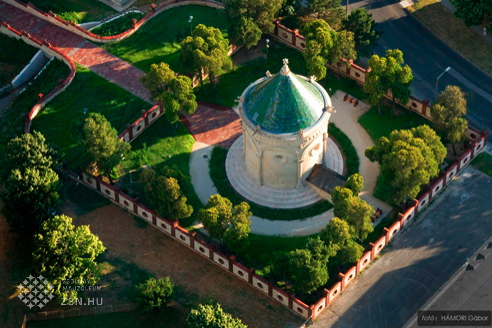ABOUT THE MAUSOLEUM

The resting place of the Zsolnay family on top of a hill right next to the factory waits for all its visitors who seek the secret of eosin in its old glory.
THE ZSOLNAY MAUSOLEUM
After Vilmos Zsolnay founder of the Zsolnay factory passed away in 1900 his son had the mausoleum erected right next to the factory on top of a little hill that had been the scaffold of the city before. The venue was not important for the family because of its shady past.
The small hill used to be a dear place of the founder of the factory where he had spent a lot of time just glazing down at the factory lying underneath. According to the plans of the son-in-law of Vilmos Zsolnay; Tádé Sikorski the construction works of the factory and the landscaping of the surrounding area had began exactly 100 years ago, in 1901. All the workers of the factory have taken part in building the Pécs Pantheon; they have worked out each and every little detail together. „… the family had all the bricklayer, carpenter, blacksmith …etc works carried out by the colleagues using the raw materials of the factory and the people working on the chapel are still mainly those who had served the old man with faith and love.” – reports the Pécsi Napló about the event in 1901.
The ore coffin of Vilmos Zsolnay was put to its eternal rest in the crypt of the family in 1913, and he was followed by his wife Terézia Bell in 1919. The only other person lying in the crypt today is their son Miklós because the mortal remains of the other family members have fallen victim to the vandal destructions after which they were reburied in the Pécs Cemetery of Honour in damaged state in 1986.
The neo-roman building includes a burial chapel and a burial chamber underneath with a decorated eosin sarcophagus and 32 coffin vaults. The facade of the mausoleum had been covered by unenameled pyrogranite tiles while the hemispheric dome had been covered by dark green majolica-glazed shaped tiles. An altar and an eternal light were placed inside the chapel the walls of which are decorated by colourful tiles. The glasses of the round windows were originally produced in the Roth workshop. On the inside surface of the mausoleum the blue sky, cherubs and golden stars watch the sleep of the deceased while seccesionist decorations and flower strings overwhelm the space by an inimitable serenity. The full inside decoration was the work of the leading sculptor of the factory; Sándor Apáti Abt. In the middle of the chapel is the bluish glazed opeion hole with a Roman column parapet through which one can look down into the sepulchral vault. On a podium in the middle of the vault lies the eosin sarcophagus of Vilmos Zsolnay decorated on all sides by figural scenes. This architectural division is characteristic to the Paris burial site of Napoleon where people looking down from above bow their heads for the deceased while in the crypt they look up to the sarcophagus that is placed on a podium. Whoever spends some time here unconsciously gives respect to those of its resting inhabitants. They say that during the time of the winter solstice when the sun is at its zenith the light coming in unravels the secret of the eosin. By paying a little attention we might become the knowers of the secret…
During the storms of history the building and its surroundings have fallen victim of constant destruction and the ceramic building elements were scattered. The full renovation of the mausoleum – except for the roofing – has been done in the framework of the Pécs2010 European Capital of Culture Programme. It included not only the renovation of the building but the promenade leading up to it with the lions and the fence that needed to be rebuilt fully from scratch based on some early photos.
















